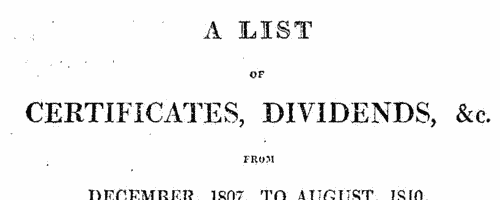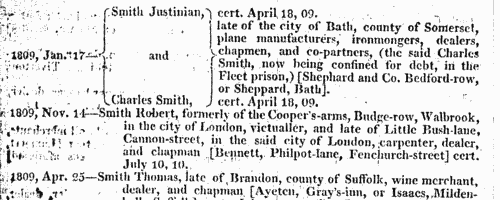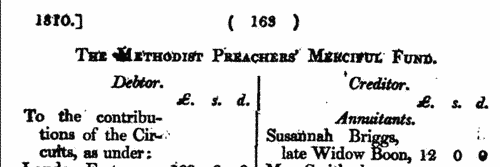Our indexes include entries for the spelling edwards. In the period you have requested, we have the following 4,343 records (displaying 1,711 to 1,720):
Bankrupts: Dividends and Certificates
(1807-1810)
William Smith's abstracts of bankruptcy certificates and dividends for England and Wales from December 1807 to 1810, referring to commissions taken out before December 1807. Each entry gives the year of the commission; the full name of the bankrupt, address, occupation, and the dates of dividends and certificate as appropriate. | Sample scan, click to enlarge

|
Bankrupts
(1808-1810)
William Smith's abstracts of bankruptcies for England and Wales from 1 January 1808 to 1 August 1810. Bankruptcy causes abrupt changes in people's lives, and is often the reason for someone appearing suddenly in a different location or in a different occupation. | Sample scan, click to enlarge

|
Wesleyan Methodist preachers on trial
(1809-1810)
After three years 'on trial' new Wesleyan Methodist preachers were admitted into full connexion with the church: lists of the ministers on trial in England and Ireland were published in the church's annual minutes. | Sample scan, click to enlarge

|
Wesleyan Methodist preachers' widows
(1809-1810)
The Wesleyan Methodist church's Merciful Fund provided annuities for preachers' widows, as well as other payments to retired clergy, widows and other dependants in need. These are listed in the annual minutes. Particularly useful is the fact that, after a widow remarried, her first married surname and her new surname were both given. | Sample scan, click to enlarge

|
Bankrupts and solicitors
(1810)
English bankrupts and their solicitors, as reported in the European Magazine. July to December 1810.
| Sample scan, click to enlarge

|
Deaths, Marriages, News and Promotions
(1810)
Death notices and obituaries, marriage and birth notices, civil and military promotions, clerical preferments and domestic occurrences, as reported in the Gentleman's Magazine. Mostly from England and Wales, but items from Ireland, Scotland and abroad.
| Sample scan, click to enlarge

|
Deaths, Marriages, News and Promotions
(1810)
Death notices and obituaries, marriage and birth notices, civil and military promotions, clerical preferments and domestic occurrences, as reported in the Gentleman's Magazine. Mostly from England and Wales, but items from Ireland, Scotland and abroad.
| Sample scan, click to enlarge

|
Essex Freeholders: Chelmsford hundred
(1810)
The poll of the freeholders of Essex at the election of a knight of the shire to serve in Parliament, taken at Chelmsford 31 January 1810 and fourteen following days (Sundays excepted). The candidates were John Archer Houblon esquire and Montagu Burgoyne esquire. This poll book gives the names of the voters arranged by initial letter of surname division by division. The freeholders' full names are stated, surname first, residence (often elsewhere), and place where the freehold lay. The right hand column records their votes. The qualification for suffrage in the counties was the possession of a freehold estate worth more than 40s a year. The electoral divisions comprised these hundreds: I. Barstable and Chafford; II. Becontree and Waltham; III. Chelmsford; IV. Hinckford; V. Tendring; VI. Uttleford, Clavering and Dunmow; VII. Harlow, Ongar and Freshwell; VIII. Lexden, Colchester and Witham; IX. Rochford and Thurstable; X. Dengie and Winstree.
| Sample scan, click to enlarge

|
Essex Freeholders: Lexden, Colchester and Witham hundreds
(1810)
The poll of the freeholders of Essex at the election of a knight of the shire to serve in Parliament, taken at Chelmsford 31 January 1810 and fourteen following days (Sundays excepted). The candidates were John Archer Houblon esquire and Montagu Burgoyne esquire. This poll book gives the names of the voters arranged by initial letter of surname division by division. The freeholders' full names are stated, surname first, residence (often elsewhere), and place where the freehold lay. The right hand column records their votes. The qualification for suffrage in the counties was the possession of a freehold estate worth more than 40s a year. The electoral divisions comprised these hundreds: I. Barstable and Chafford; II. Becontree and Waltham; III. Chelmsford; IV. Hinckford; V. Tendring; VI. Uttleford, Clavering and Dunmow; VII. Harlow, Ongar and Freshwell; VIII. Lexden, Colchester and Witham; IX. Rochford and Thurstable; X. Dengie and Winstree.
| Sample scan, click to enlarge

|
Essex Freeholders: Tendring hundred
(1810)
The poll of the freeholders of Essex at the election of a knight of the shire to serve in Parliament, taken at Chelmsford 31 January 1810 and fourteen following days (Sundays excepted). The candidates were John Archer Houblon esquire and Montagu Burgoyne esquire. This poll book gives the names of the voters arranged by initial letter of surname division by division. The freeholders' full names are stated, surname first, residence (often elsewhere), and place where the freehold lay. The right hand column records their votes. The qualification for suffrage in the counties was the possession of a freehold estate worth more than 40s a year. The electoral divisions comprised these hundreds: I. Barstable and Chafford; II. Becontree and Waltham; III. Chelmsford; IV. Hinckford; V. Tendring; VI. Uttleford, Clavering and Dunmow; VII. Harlow, Ongar and Freshwell; VIII. Lexden, Colchester and Witham; IX. Rochford and Thurstable; X. Dengie and Winstree. Tendring hundred includes Manningtree.
| Sample scan, click to enlarge

|
Research your ancestry, family history, genealogy and one-name study by direct access to original records and archives indexed by surname.











